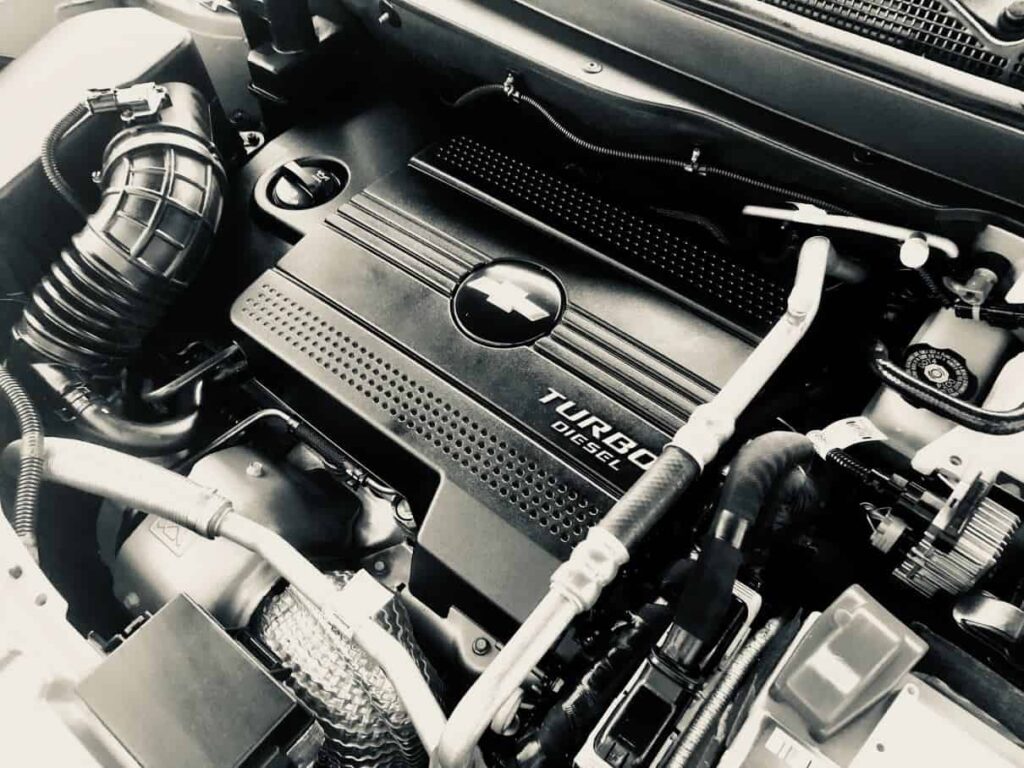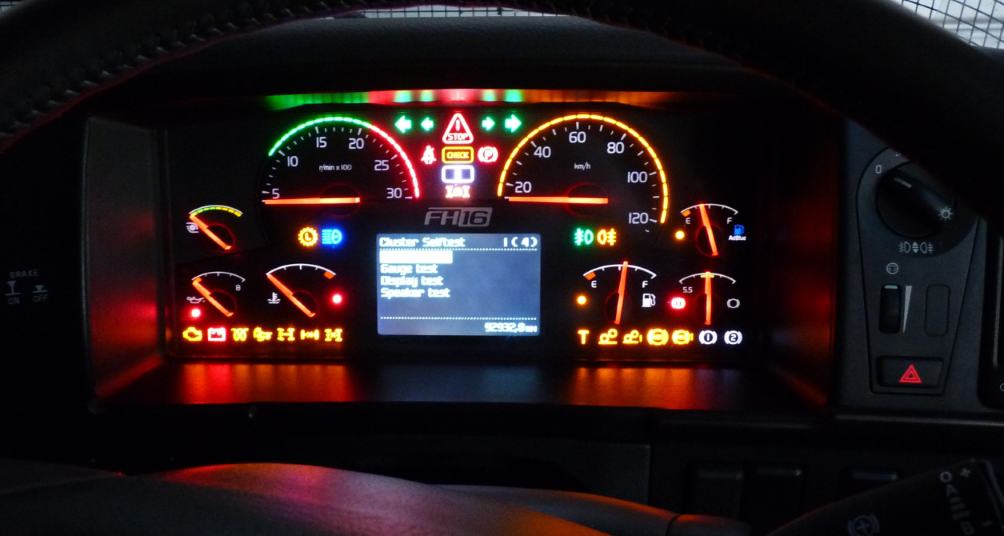Nowadays, it’s quite common to see gasoline engines reaching the 200,000-mile mark and still running fine, however, for some reason diesel engines always seem to last significantly longer. Why is that? Stick around for the answer!
Do Diesel Engines Last Longer?
Yes! Diesel engines do last longer. Back when I used to work at a semi-truck dealership, it was pretty common to see diesel semi-trucks with 700,000 miles on the clock with the same engine.

And, it’s a similar story with diesel cars and pickup trucks. If taken care of, they seem to have no trouble passing the 400,000-mile mark.
Why Do Diesel Engines Last Longer?
Both diesel and gasoline engines are internal combustion engines. They’re both reciprocating engines, meaning they are both driven by pistons that are moving laterally in two directions. The internal components of both designs are similar, but diesel engines last longer because of these three main reasons:
Stronger Construction Materials
This is the main reason behind diesel engines lasting so long when compared to their gasoline counterparts. But before going further, we need to understand why diesel engines are so popular in heavy machinery.
The main benefit of a diesel engine is fuel efficiency. Diesel engines are 15 – 25% more fuel-efficient than gasoline engines.
Diesel engines reach such high efficiencies for a couple of reasons, the main two being the high compression ratio and 15% more energy-dense fuel.
The average gasoline car has an 8:1 compression ratio, while compression ratios in diesel engines range from 14:1 all the way to 24:1. Unlike a gasoline engine, a diesel engine does not require an ignition system because the engine ignites the air-fuel mixture with the use of high compression.
The air inside the combustion cylinder gets squeezed so much that it gets extremely hot. So hot in fact, that diesel fuel is ignited instantly once it’s sprayed into the combustion chamber.
Now, it’s no secret that diesel engines are mostly used in things that cannot afford to break down, for example – semi-trucks. So, in order to withstand the higher forces that come with higher compression ratios, diesel engines are made with bigger and heavier materials.
Stronger and bigger cylinder walls, pistons, bearings, etc. are one of the main reasons why diesel engines last so long.
Lower RPMs Equals Less Wear
Diesel engines, due to their high compression design and slow-burning properties of the fuel itself, are limited to operating in a smaller range of RPMs. Lower RPMs are not a problem when it comes to power as diesel engines have a longer stroke and, in combination with specially designed gearing, diesel engines have excellent torque.
Most diesel semi-trucks run at a 1000-2000 RPM, while most passenger diesel cars like to run at 1300-2800 RPM. Because diesel engines operate at a relatively low range of RPMs, the rate of wear on the internal parts of the engine is lower when compared to gasoline engines.
Chemical Properties of Diesel Fuel
Lastly, the diesel fuel itself plays a significant role in diesel engine longevity. There are two ways that diesel fuel positively impacts the reliability of the engine:
Diesel burns slower
The combustion process in a diesel engine is a bit more gradual when compared to that of a gasoline engine. Because the gas expansion during combustion in a diesel engine is not as rapid, the internal rotating parts are subjected to less shock.
Diesel acts as a lubricant
If you’ve ever touched diesel fuel, the first thing you’ve probably noticed is how oily it is. It takes a long time to evaporate and even if you put a blowtorch to a cup of diesel, there is no chance that you’ll ignite it.
Because diesel fuel is a pretty good lubricant, it actually lubricates the cylinder walls and reduces wear in the combustion chamber.
How to Make Your Diesel Engine Last Longer
Lately, with the ever-increasing regulations on exhaust emissions, modern diesel engines have been fitted with various exhaust emissions treatment systems. Even though the diesel engines themselves are built well, the additional emissions treatment systems are certainly not reliable, to say the least.
Diesel Particulate Filters and Exhaust Gas Recirculation valves clog up, while Selective Catalytic Reduction systems face their own challenges in clogged nozzles and failed NOx sensors.
While there is not much you can do to directly prevent these additional systems from going bad, following proper maintenance schedules and routines will certainly help to increase the reliability of your diesel engine. Here are a few tips to make your diesel last longer:
- Use low-ash API CJ-4 diesel motor oil. Low-ash motor oil is more resistant to heat and leaves lower amounts of deposits when it burns. This is especially important for modern diesel engines that use DPF and EGR systems. Without low-ash oil, the DPF and EGR will get congested much faster. For more information about diesel motor oil click here to check out our article on the ‘Best Oil for Turbo Diesel Engines’.
- Regular oil changes. Motor oil is the lifeblood of your diesel engine. Make sure to change the motor oil periodically in order to flush the acidic combustion byproducts and sludge that has accumulated over time.
- Avoid short trips if possible. Internal combustion engines hate short trips as they are unable to reach their operating temperature. Diesel engines that are equipped with a DPF especially. The DPF needs to heat up in order to properly burn off the trapped particles, but if your trips consist of on/off runs from home to local shops, the DPF will clog up fast. Once the DPF gets clogged, the vehicle will start to idle high and unevenly, produce black smoke and eventually go into an engine de-rate mode (or a limp home mode), where it limits power in order to protect the engine.
- Avoid prolonged idling if not necessary. Diesel emission control systems don’t like idling for an extended period of time. Prolonged idling times increase the buildup of soot on the DPF, so make sure to turn your engine off if it’s not necessary.
- Clean your DPF by going on the highway. If your vehicle doesn’t automatically inform you that the DPF is full and needs regeneration, then it’s a good idea to go for a drive on the highway occasionally. Highway driving is perfect for regeneration, as the DPF is easily able to reach the required temperature.
Sources:
Diesel Engine Construction and Operation – Engineers Edge

Eddie is the co-founder of CarCareCamp.com, and the site’s primary contributor.
Under his belt, Eddie has a bachelor’s degree in Automotive Electronics Engineering and almost a decade of experience working as a semi-truck technician (specializing in electrics).


I like how you mentioned that compared to gasoline engines, diesel engines are 15% to 25% more fuel-efficient. The company I work for is thinking about looking for garbage truck sales because my manager noticed that the regular gas vehicles we’re using aren’t getting good fuel economy when doing their trash pickups. I think it’s a good idea to consider buying vehicles from a reputable company that has high-quality trucks to save on fuel costs.